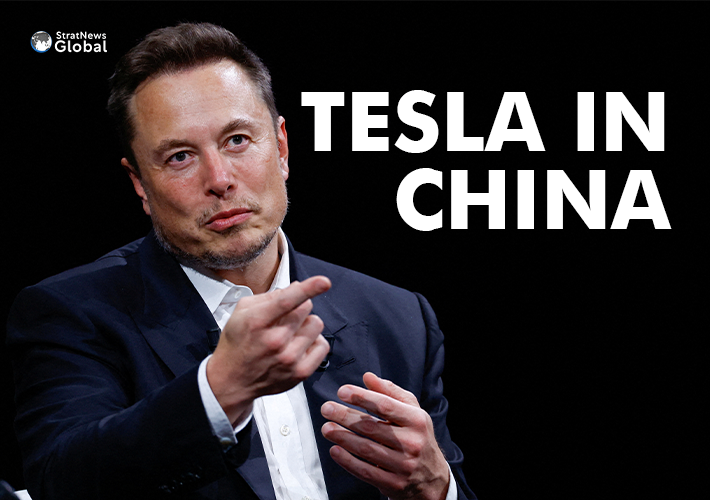Tesla CEO Elon Musk made an unannounced visit to Beijing on Sunday, where, according to the Wall Street Journal, he has won tentative approval for the Full Self Driving software to be introduced in China. But it’s not clear if the same could be exported to the US since it contains Chinese company Baidu’s mapping data licence and lane level navigation service.
According to Reuters quoting Chinese state media, Musk called on Premier Li Qiang. In their meeting, Li mentioned to Musk that Tesla’s operations in China serve as a prime example of successful economic and trade collaboration between the U.S. and China.
“Honoured to meet with Premier Li Qiang. We have known each other now for many years, since early Shanghai days,” Musk posted on social media platform X, as he appeared in a picture with the premier.
Tesla reached an accord with Chinese authorities for a plant in Shanghai, its first outside the United States, in 2018.
The U.S. electric vehicle maker rolled out FSD, the most autonomous version of its Autopilot software, four years ago but has yet to make it available in China, its second-largest market globally, despite customer demand.
Musk said this month that Tesla may make FSD available to customers in China “very soon,” in response to a query on X.
Equity analysts at Wedbush called the surprise visit “a major moment for Tesla.”
“While the long term valuation story at Tesla hinges on FSD and autonomous, a key missing piece in that puzzle is Tesla making FSD available in China which now appears on the doorstep,” Wedbush said in an emailed company report.
Rival Chinese automakers such as Xpeng have been seeking to gain an advantage over Tesla by rolling out similar software.
Tesla has since 2021 stored all data collected by its Chinese fleet in Shanghai as required by Chinese regulators and has not transferred any back to the United States.
Musk is looking to obtain approval to transfer data collected in the country abroad to train algorithms for its autonomous driving technologies, the person said.
Musk’s visit to China, first reported by Reuters, was not flagged publicly and the person spoke on condition of anonymity because they were not authorised to speak with the media. Tesla did not respond immediately to a request for comment.
Chinese state broadcaster CCTV in its report about Musk’s meeting with Li did not say whether the two had discussed FSD or data.
Earlier in the day, a separate report carried by state radio said Li had visited the ongoing Beijing auto show and had commented about how China’s smart new energy vehicle (NEV) sector had gained a leading position in the market and that the country had to work hard and maintain its advantages.
Musk also met with Ren Hongbin, a government official who heads the China Council for the Promotion of International Trade, the organiser of the auto show, state media reported.
“It is good to see electric vehicles making progress in China. All cars will be electric in the future,” Musk said in a video posted on social media by a user affiliated with state media.
Late Sunday, a leading Chinese automotive association released a list of 76 car models that it claimed met China’s data security standards, including Tesla’s Model Y and Model 3. This announcement coincided with Musk’s visit to China, which occurred just over a week after he cancelled a scheduled trip to India where he was to meet Prime Minister Narendra Modi, due to pressing commitments at Tesla.
The company said this month it would lay off 10% of its global workforce as it grapples with falling sales and an intensifying price war for EVs led by Chinese brands.
U.S. auto safety regulators said on Friday they had opened an investigation into whether Tesla’s recall of more than 2 million vehicles in the United States announced in December to install new Autopilot safeguards was adequate following a series of crashes.
GM’S BARRA VISITED
GM CEO Mary Barra made an unannounced visit to the show in the world’s biggest auto market on Friday, according to two people with knowledge of her schedule. GM did not immediately respond to a request for comment.
Also on Friday, Grace Tao, Tesla vice president in charge of external relations in China, published a commentary on the social media account of state media outlet People’s Daily, arguing that autonomous driving technologies would be the new growth engine for the EV industry.
Tao said Tesla was leading autonomous driving research and development with its “end-to-end neural network” technology and data collected from millions of cars on the road.
China’s complicated traffic conditions with more pedestrians and cyclists than in many other markets provide more scenarios that are key for training autonomous driving algorithms at a faster pace, according to industry experts.
Musk said last week that Tesla would introduce new cheaper models using its current EV platforms and production lines and would offer a new “robotaxi” with self-driving technology. He said on X this month that he would unveil the robotaxi on Aug. 8.
Tesla shares have lost almost a third of their value since the start of the year, as concerns have grown about the EV maker’s growth trajectory. Last week, Tesla reported its first decline in quarterly revenue since 2020, when the COVID-19 pandemic slowed production and deliveries.
With Inputs From Reuters

